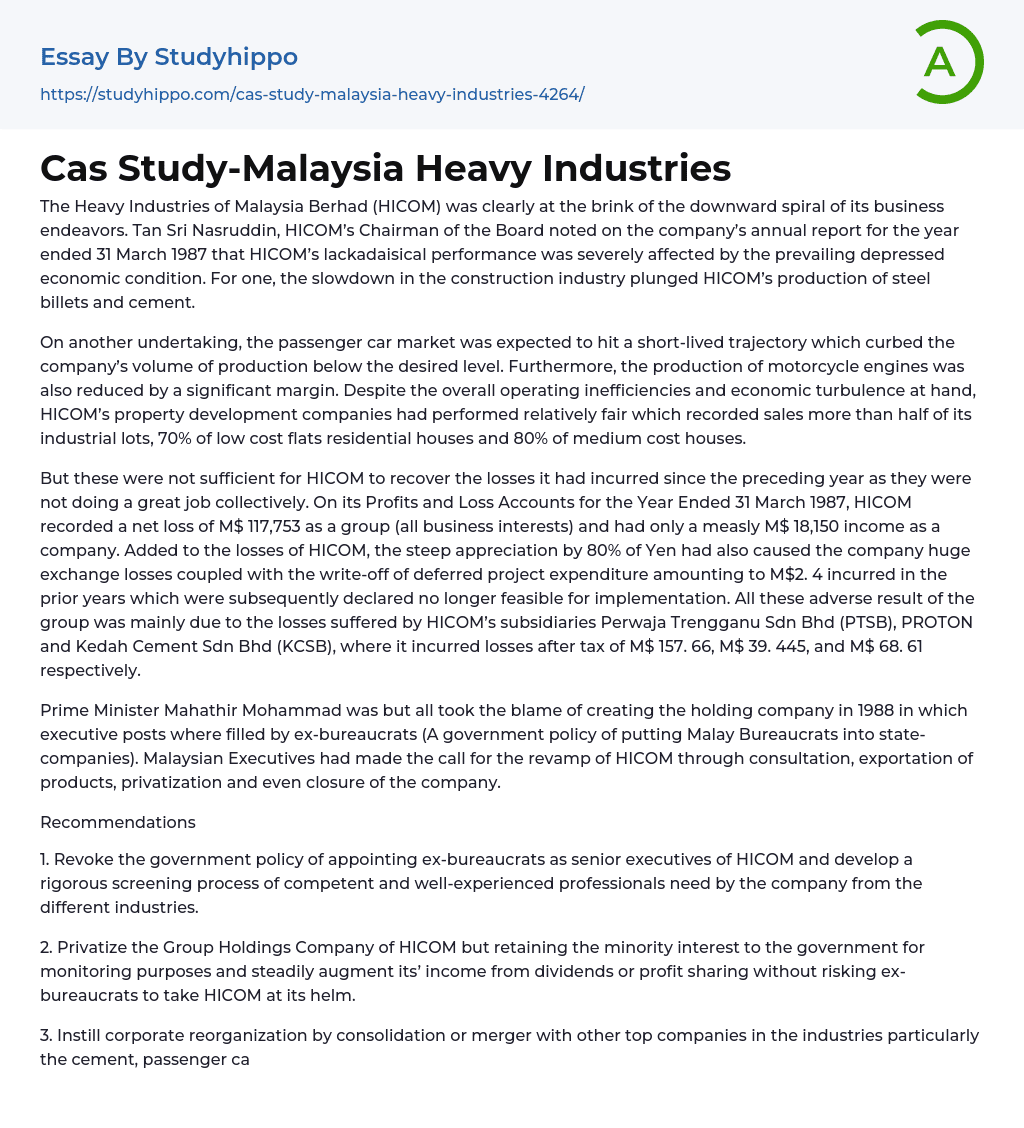At the brink of its business endeavors, The Heavy Industries of Malaysia Berhad (HICOM) was clearly in a downward spiral.
According to Tan Sri Nasruddin, Chairman of the Board for HICOM, the company's lackluster performance in 1987 was greatly affected by the depressed economic condition. The slowdown in the construction industry led to a decline in HICOM's production of steel billets and cement. Moreover, there was a temporary decrease in the passenger car market, resulting in a drop in production volume for the company. Additionally, there was a notable reduction in motorcycle engine production.
Despite facing overall operating inefficiencies and economic turbulence, HICOM's property development companies have achieved reasonable performance. They have recorded sales of more than half of their industrial lots, 70% of low-cost flats residential houses, and
...80% of medium-cost houses. However, these results have not been enough for HICOM to recover from the losses it incurred in the previous year. The company's overall profit and loss accounts for the year ending on March 31, 1987, show a net loss of M$ 117,753 for the entire group of business interests and a meager income of M$ 18,150 for the company alone. In addition to HICOM's losses, the significant appreciation of the Yen by 80% has caused substantial exchange losses for the company. This situation is further compounded by the need to write off deferred project expenditure amounting to M$ 2.
The group experienced adverse results in the prior years due to losses incurred by HICOM's subsidiaries - Perwaja Trengganu Sdn Bhd (PTSB), PROTON, and Kedah Cement Sdn Bhd (KCSB). PTSB, PROTON, and KCSB incurred losses after tax of M$ 157.66, M$ 39.445, and M$ 68.61 respectively
Prime Minister Mahathir Mohammad took the blame for creating the holding company in 1988, which was staffed by ex-bureaucrats as part of a government policy.
Malaysian Executives had called for the revamp of HICOM through various measures such as consultation, product exportation, privatization, and even company closure.
Recommendations
- Revoke the government policy of appointing ex-bureaucrats as senior executives of HICOM and establish a stringent screening process to attract competent professionals with industry expertise.
- Privatize the Group Holdings Company of HICOM but retain a minority interest for government monitoring. Increase income through dividends or profit sharing without allowing ex-bureaucrats to hold top positions at HICOM.
3. Merge or consolidate with other leading companies in the cement, passenger cars, and steel industries to implement corporate reorganization.
- Renault essays
- Truck essays
- chrysler essays
- The city essays
- Racing essays
- Bicycle essays
- Cars essays
- Rms Titanic essays
- Audit essays
- Budgeting essays
- Cost Accounting essays
- Abolitionism essays
- Adam Smith essays
- American History essays
- American Revolution essays
- Ancient Egypt essays
- Articles Of Confederation essays
- Atlantic Slave Trade essays
- Aztec essays
- Benjamin Franklin essays
- Civil Rights Act of 1964 essays
- Civil Rights Movement essays
- Civil war essays
- Cleopatra essays
- French And Indian War essays
- Gettysburg essays
- Great Depression essays
- Hurricane Katrina essays
- Industrial Revolution essays
- Jamestown essays
- Manifest Destiny essays
- Mccarthyism essays
- Patrick Henry essays
- Pearl Harbor essays
- Pocahontas essays
- Prohibition essays
- Pyramids essays
- Salem Witch Trials essays
- Slavery essays
- The New Deal essays
- Thirteen Colonies essays
- Westward Expansion essays
- Bangladesh essays
- China essays
- Hong Kong essays
- India essays
- Japan essays
- Kuala Lumpur essays
- Malaysia essays
- Manila essays




